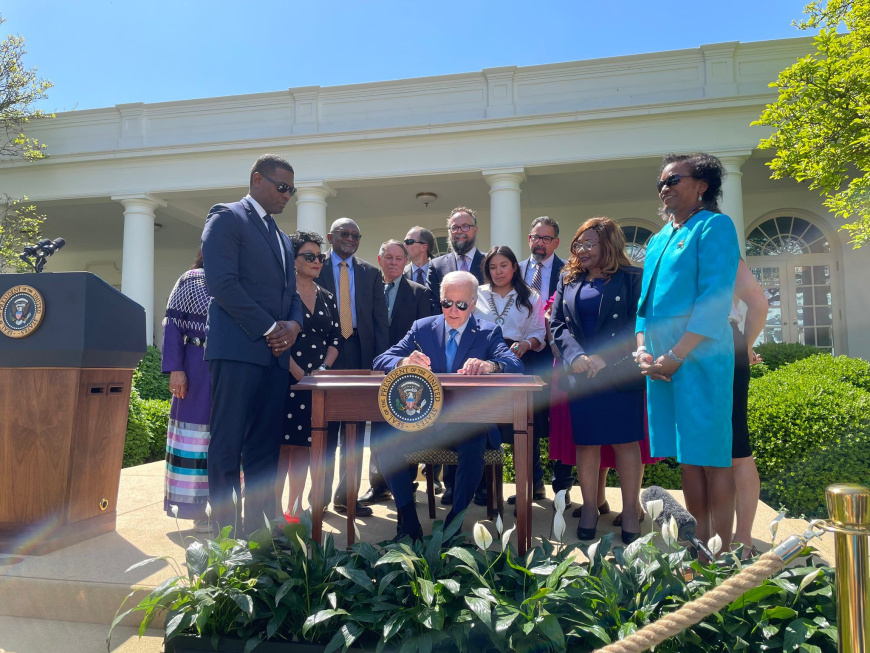
 back to all news
back to all news
SEAS Prof. Kyle Whyte contributes to historic executive order on environmental justice signed by Pres. Biden

President Joe Biden signed a historic executive order called Revitalizing Our Nation’s Commitment to Environmental Justice for All, which will direct federal agencies to focus on confronting longstanding environmental injustices, furthering the administration’s commitment to environmental justice. Kyle Whyte, the George Willis Pack Professor at the University of Michigan School for Environment and Sustainability (SEAS), a U.S. Science Envoy, and a member of the White House Environmental Justice Advisory Council, served as an advisor on the development of the new environmental justice executive order and stood behind Biden in the Rose Garden at the signing.
The executive order, which Biden signed on April 21, 2023, adds to the environmental justice agenda he set forth in his first week in office, advancing the administration’s efforts to help communities that have faced persistent environmental injustices such as toxic pollution, underinvestment in infrastructure and other critical services, and disproportionate environmental harms that are often due to racial discrimination. The order also includes an expansion of interagency coordination and the launch of a new Office of Environmental Justice within the White House Council on Environmental Quality so that federal efforts can evolve as appropriate. “Under this order, environmental justice will become the responsibility of every single federal agency, I mean every single federal agency. That means every federal agency must take into account environmental and health impacts on communities and then work to prevent those negative impacts. Environmental justice will be the mission of the entire government, woven directly into how we work with state, local, Tribal and territorial governments,” said Biden.
Whyte says that this is a significant action that builds upon and supplements the efforts of an executive order signed by President Bill Clinton nearly 30 years ago. “The order signed by President Clinton came on the heels of the University of Michigan Conference on Race and the Incidence of Environmental Hazards in 1990, which essentially put environmental justice on the map as a legitimate academic endeavor and sparked government meetings as well as a special task force by the Environmental Protection Agency. That executive order was the first to recognize and begin to address the impacts of harmful pollution on underserved and overburdened communities,” said Whyte.
He continued, “With this new executive order, we’re adding many new tools and resources that have been designed through hundreds upon hundreds of hours of work. This is truly a historical moment, and I can’t emphasize how critical it is that we got this across the finish line. After my colleagues and I have spent so many weekends and late nights over the course of the last two years making and improving recommendations, it is a profound relief that President Biden has signed this new executive order. I’m grateful to so many people both inside and outside of government, and profoundly to the environmental justice leaders whose decades of endurance and labor have fostered the possibilities before us.”
Jonathan Overpeck, Samuel A. Graham Dean at SEAS added, “Thirty years ago, faculty from our school created the first academic program focused on environmental justice, and this White House collaboration of Professor Kyle Whyte and colleagues will help make sure environmental justice gets infused in all we as a people do to create a more sustainable world where all can thrive. I can’t tell you how proud and appreciative I am of Kyle’s efforts, both on campus and off.”
As part of a series of events and announcements throughout Earth Week that focused on furthering the President’s Investing in America agenda, which aims to create well-paying clean energy jobs, meet climate goals and advance environmental justice and conversation among other goals, this action is intended to ensure that the nation’s foundational environmental and civil rights laws benefit all people, regardless of race, background, income, ability, Tribal affiliation or ZIP code.
In addition to a deepened commitment to environmental justice as central to civil rights and environmental laws, some of the details of the action include efforts to better protect communities overburdened from pollution and environmental harms; efforts to confront existing and legacy barriers and injustices; promoting science, data and research to understand cumulative impacts; and increasing accountability and transparency in federal environmental justice policy.
The Biden-Harris Administration announced additional new steps that further a historic commitment to environmental justice, including a first-ever Environmental Justice Scorecard, which will task Federal agencies with conducting new assessments of their environmental justice efforts and will be made public through a new scorecard to help measure the government's progress on the issue. They will also launch the White House Campaign for Environmental Justice, announce new Justice40 programs and take new actions to combat plastic pollution in communities.
More information about the executive order and additional actions, as well as a review of the administration’s work to advance environmental justice since Biden took office, is available in the White House’s official statement.

